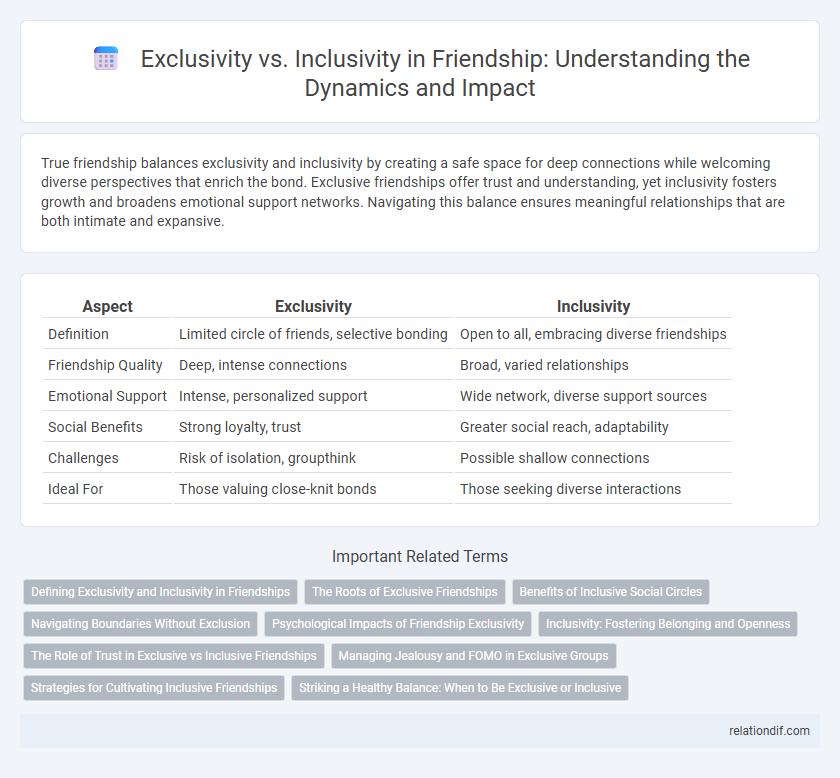True friendship balances exclusivity and inclusivity by creating a safe space for deep connections while welcoming diverse perspectives that enrich the bond. Exclusive friendships offer trust and understanding, yet inclusivity fosters growth and broadens emotional support networks. Navigating this balance ensures meaningful relationships that are both intimate and expansive.
Table of Comparison
| Aspect | Exclusivity | Inclusivity |
|---|---|---|
| Definition | Limited circle of friends, selective bonding | Open to all, embracing diverse friendships |
| Friendship Quality | Deep, intense connections | Broad, varied relationships |
| Emotional Support | Intense, personalized support | Wide network, diverse support sources |
| Social Benefits | Strong loyalty, trust | Greater social reach, adaptability |
| Challenges | Risk of isolation, groupthink | Possible shallow connections |
| Ideal For | Those valuing close-knit bonds | Those seeking diverse interactions |
Defining Exclusivity and Inclusivity in Friendships
Exclusivity in friendships centers on deep, selective bonds with a limited group, emphasizing trust and intimacy, while inclusivity embraces forming connections with a diverse and broad range of people. Exclusive friendships often foster strong emotional support and loyalty, whereas inclusive friendships promote social diversity and expansive networks. Understanding these dynamics helps balance the need for close, meaningful relationships with the benefits of wide social engagement.
The Roots of Exclusive Friendships
Exclusive friendships often stem from deep-rooted psychological needs for security and identity reinforcement, where individuals seek validation within a select group. Social dynamics involving trust, shared experiences, and cultural background further solidify exclusive bonds, creating boundaries that limit inclusivity. These relationships can foster strong loyalty but may unintentionally exclude diverse perspectives and broader community connections.
Benefits of Inclusive Social Circles
Inclusive social circles foster diverse perspectives, enhancing emotional support and creativity within friendships. Embracing inclusivity reduces social isolation, promoting mental well-being and resilience. Broader social networks also increase opportunities for personal growth, collaboration, and resource sharing.
Navigating Boundaries Without Exclusion
Navigating boundaries in friendship requires balancing respect for personal limits with openness to diverse connections. Setting clear expectations fosters trust without creating unnecessary exclusivity. Emphasizing inclusive communication strengthens bonds while honoring individual needs.
Psychological Impacts of Friendship Exclusivity
Friendship exclusivity often leads to heightened feelings of belonging and trust within the selected group, but it can simultaneously cause social isolation and decreased self-esteem for those excluded. Psychological studies indicate that exclusivity triggers stress responses and anxiety in individuals who feel left out, impacting overall mental wellbeing. In contrast, inclusive friendships promote emotional security, reduce loneliness, and enhance social support networks, contributing positively to psychological health.
Inclusivity: Fostering Belonging and Openness
Inclusivity in friendship cultivates a sense of belonging by welcoming diverse perspectives and embracing differences, which strengthens emotional bonds and trust. An inclusive approach encourages open communication and mutual respect, fostering a supportive environment where individuals feel valued and understood. This openness enhances social connections, promoting mental well-being and resilience through shared experiences and acceptance.
The Role of Trust in Exclusive vs Inclusive Friendships
Trust plays a crucial role in shaping exclusive versus inclusive friendships, acting as the foundation for deeper emotional bonds in exclusive friendships while fostering broader social support in inclusive friendships. In exclusive friendships, trust enables vulnerability and shared secrets, creating a strong sense of loyalty and mutual understanding. Inclusive friendships rely on trust to maintain openness and acceptance among diverse group members, enhancing collective well-being and social cohesion.
Managing Jealousy and FOMO in Exclusive Groups
Managing jealousy and fear of missing out (FOMO) in exclusive friendship groups requires clear communication and emotional awareness. Establishing boundaries and openly discussing feelings helps prevent misunderstandings and resentment among friends. Encouraging inclusivity by occasionally inviting others fosters trust and reduces the negative impact of exclusivity on group dynamics.
Strategies for Cultivating Inclusive Friendships
Cultivating inclusive friendships involves embracing diverse perspectives and fostering open communication to build trust and understanding. Prioritizing empathy and active listening helps create a safe space where everyone feels valued and respected. Engaging in shared activities that celebrate different backgrounds strengthens connections and encourages a sense of belonging among all friends.
Striking a Healthy Balance: When to Be Exclusive or Inclusive
Striking a healthy balance in friendship involves knowing when to be exclusive by nurturing deep, meaningful connections with a few trusted individuals and when to be inclusive by welcoming new acquaintances to enrich social experiences. Exclusive friendships provide emotional safety and trust, while inclusive interactions foster personal growth and diverse perspectives. Recognizing the appropriate context for exclusivity versus inclusivity strengthens overall social well-being and resilience.
exclusivity vs inclusivity Infographic

 relationdif.com
relationdif.com